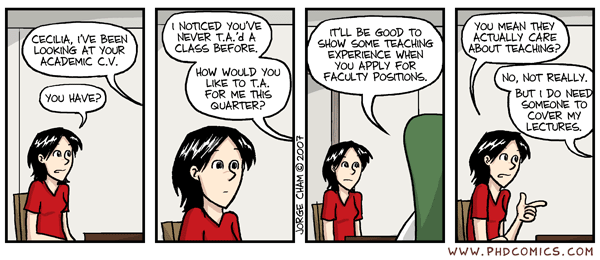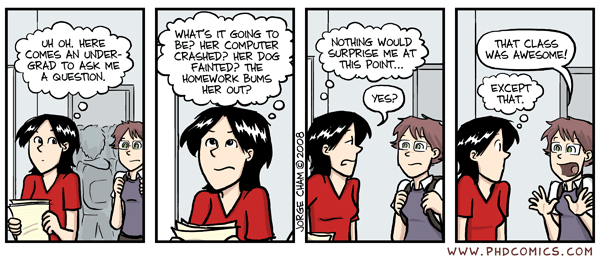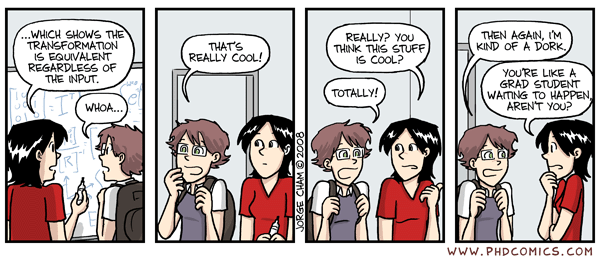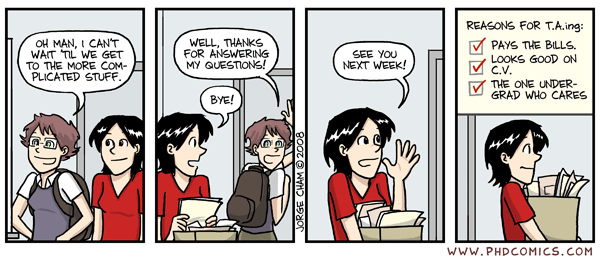How to Teach
|
Last Update: Monday, 15 September 2014
Note:  or
or  material is highlighted
material is highlighted
|
For further advice on success in your graduate program (and beyond), visit:
Information for Grad Students in CSE @ UB
"Research and teaching have always cohabited: anyone who teaches a
subject well wants to know more about it, and when she knows more, to
impart that knowledge."
"Since starting my working life in electrical engineering, I have seen
more fundamental changes in that field than in computer science.
However, my electrical engineering education remains valuable because it
stressed fundamental science and mathematics. … The problems
caused by technology changing quickly are actually a subset of the
problems caused by the fact that nobody can be familiar with all
technologies at once. Educators should teach fundamentals,
illustrating them with example technologies. Graduates stay current by
learning about new technology as needed."
- Parnas, David Lorge (2003), "Give Meaning to the Status of Software
Engineer" (letter to the editor), Communications of the ACM
46(3) (March): 12–13; quote on p. 12.
-

-
UB Teaching and Learning Center
-
TA Orientation — Fall 2007 (Powerpoint)
-
CSE Graduate Handbook:
Assistantships—General Information
-
Generic Recitation-Section Lesson Plan
-
Rapaport, William J. (2006)
"Advice for (New) TAs"
[Powerpoint]
-
 Rapaport, William J. (2014),
"How to Give Presentations & How to Teach"
Rapaport, William J. (2014),
"How to Give Presentations & How to Teach"

-
Rapaport, William J. (2006),
"How I Grade"
-
Rapaport, William J. (2006),
William Perry's Scheme
of Intellectual and Ethical Development"
-
Althen, Gary (1988),
"Manual for Foreign Teaching Assistants".
-
Case, Bettye Anne (ed.) (1989),
Keys to Improved Instruction by Teaching Assistants
and Part-Time Instructors, MAA Notes No. 11
(Mathematical
Association of America); ISBN 0-88385-061-3.
- Out of print, but Rapaport has a copy somewhere:-)
- Available for purchase (25 Aug 2006) at:
alibris.com,
barnesandnoble.com,
Biblio.com, etc.
- Some of it is online at:
-
Columbia University Graduate School of Arts & Sciences
Teaching Manual
-
Cohen, Robby; & Robin, Ron (eds.) (1985),
"Teaching at Berkeley:
A Guide for Foreign Teaching Assistants",
from Case 1989.
- Reznick, Bruce A. (1985),
"Chalking It Up:
Advice to a New TA", from Case 1989.
-
Expectations that TAs
(should) have of the faculty that they work for.
-
University of Iowa Teaching Resources
-
Speaking of Teaching:
Stanford University's Newsletter on Teaching
- Continually updated, with articles on topics like:
- How to Create Memorable Lectures
- Teaching in the US Classroom
- Faculty/TA Teaching Partnerships
- etc.
-
Arras, John D. (2006, March 24),
"It's a Simple Game:
A professor reduces his teaching life to a few bullet points"
,
Chronicle of Higher Eduation, p.C3.
-
Brookfield, Stephen D.;
&
Preskill, Stephen
(2005),
"Keeping Discussion Going through Questioning, Listening, and
Responding",
Discussion as a Way of Teaching
(San Francisco: Jossey-Bass/Wiley), Ch.5.
-
Brown, Ron (2006),
"Five Short Stories on Teaching",
Tomorrow's Professor #693 (Jan. 27).
-
Bugeja, Michael J.
(2007),
"Distractions in the Wireless Classroom",
Chronicle of Higher Education
(26 January): C1,C4.
- "Getting your students' attention may be as simple as
requiring them to turn off the technology."
-
Cushman, Thomas
(2007),
"Hemlock Available in the Faculty Lounge",
Chronicle of Higher Education
(16 March): B16.
- What teaching evaluations for Socrates might have looked
like (humor).
-
Grafton, Anthony (2006),
"The Nutty Professors:
The History of Academic Charisma",
The New Yorker (23 October): 82-87.
-
A review of Clark, William (2006), Academic Charisma and the
Origins of the Research University.
- If you've ever wondered about the history of academic lectures
in universities and how universities evolved to be what they
are today, you might find this review of interest.
-
Hummel, Rolf E. (2005),
"Contemplations after Forty Years of Teaching",
University of Florida Pedagogator
3(13) (July/Aug).
- Advice on how to give a lecture.
-
Lang, James M.
(2006),
"Shaking Things Up",
Chronicle of Higher Education
(3 November): C2-C3.
- "In the crush of midsemester deadlines and obligations,
how can you find time to rethink your teaching techniques"
-
Lang, James M.
(2007),
"Did You Learn Anything?",
Chronicle of Higher Education
(9 March): C1,C4.
- A plea for midsemester course evaluations:
"Students are very accurate jusges of the most important
question we can ask them about their classroom experiences."
-
Lang, James M.
(2007),
"Classroom Transparency",
Chronicle of Higher Education
(6 April): C2-C3.
- "The best teachers are the ones who take the time to explain
to students why they are learning what they are learning."
-
Lang, James M.
(2007),
"Perfecting Your Vocal Technique",
Chronicle of Higher Education
(4 May): C2-C3.
- "You may resist the notion of teaching as a performance,
but your classroom voice can help or harm student
attentiveness."
-
Lang, James M.
(2007),
"Finding a Light",
Chronicle of Higher Education
(21 September): C2-C3.
- "A self-published book on teaching is the surprising source
of some valuable insights on the college classroom": Teaching as a
dance, Class preparation, Seating charts, The wisdom of A students,
Talking outside of class.
-
Leavitt, Melissa C.
(2006),
"Team Teaching:
Benefits and Challenges"
-
Loui, Michael C.
(2003),
"A Selected Bibliography on College and University Teaching"
- Loui is Professor of Electrical and Computer Engineering
at the University of Illinois at Urbana-Champaign
-
Singham, Mano
(2004),
"Talkers and Listeners",
National Teaching and Learning Forum Newsletter
13(2).
- On how to run successful discussion sessions,
given that some students "hog" the conversation
(talkers) and others never speak (listeners).
-
Meacham, Jack
(2006),
"Questioning the Best Learning Technology",
Peer Review
8(4) (Fall).
- Meacham is a UB prof of psychology.
-
Mosteller, Frederick
(1980),
"Classroom and Platform Performance",
American Statistician
34(1): 11-17.
- " A good metaphor for making presentations is good teaching.
Teachers seek to explain content and thinking; and to present that
material with credibility, with authority, and without patronizing
authoritarianism. Here is an excellent paper by the great statistician
Frederick Mosteller on teaching." —Edward Tufte
-
Wankat, Phillip;
&
Oreovicz, Frank
(2006),
"Activity Breaks:
A Push for Participation",
ASEE Prism
15(5; January).
- "Looks at ways to use "activity breaks" to modify
the lecture approach."
- "ASEE" is the American Society for Engineering Education.
-
Pai, Aditi,
"Adapting to the American Classroom:
Evolution of an International Teaching Assistant",
Teaching and Learning (UB Center for Teaching and Learning
Resources) 3(1): 3-5.
-
Faculty/TA Teaching Teams,
Tomorrow's Professor #854
-
Description of an
Online Tutorial for Designing Effective and Innovative Courses,
Tomorrow's Professor Msg.#874 (Stanford University)
-
Doyle, Terry (2008):
NEA Higher Education Advocate
26(1) (October): 5-8.
-
Felder, Richard M.;
& Brent, Rebecca
(2008–2009),
"The Ten Worst Teaching Mistakes",
Chemical Engineering Education
-
Patterson, David (2009),
"Your Students Are Your Legacy",
Communications of the ACM
52(3) (March): 30-33.
- An article on how to advise graduate students.
-
Ullman, Jeffrey D. (2009),
"Advising Students for Success",
Communications of the ACM
52(3) (March): 34-37.
- Another article on how to advise graduate students.
-
Vicens, Quentin; & Bourne, Philip E.
(2009),
"Ten Simple Rules to Combine Teaching and Research",
Tomorrow's Professor Msg. 948.
-
Huston, Therese (2009),
"How to Teach What You Don't Actually Know",
Chronicle of Higher Education
55(42) (24 July): A25–A26.
-
Barkley, Elizabeth F. (2010),
"Student Engagement Techniques for Seminars",
Tomorrow's Professor Msg. 1029.
-
Wailgum, Thomas
(2010),
"How Steve Jobs Beats Presentation Panic",
Macworld
(October): 54–55.
-
Sternberg, Robert J.
(2010),
"Teach Creativity, not Memorization",
Chronicle of Higher Education
(15 October): A29.
-
Clark, Richard;
Kirschner, Paul A.;
& Sweller, John
(2012),
"Putting Students on the Path to Learning:
The Case for Fully Guided Instruction",
American Educator
36(1) (Spring): 6–11.
-
Rosenshine, Barak
(2012),
"Principles of Instruction:
Research-Based Strategies that All Teachers Should Know",
American Educator
36(1) (Spring): 12–19, 39.
-
Su, Francis Edward
(2013),
"The Lesson of Grace in Teaching",
The Mathematical Yawp
(18 January).
- Not only good advice on teaching, but also on being a
"mensch".
-
Immerwahr, John (2012),
"Teach Philosophy 101"
- Aimed primarily at philosophy teachers, but has very useful
information
for teachers of any subject on how to organize your courses.
-
Corbett, Steven J.; & LaFrance, Michelle (2013),
"It's the Little Things that Count in Teaching",
Chronicle of Higher Education
(13 September): A30–A31.
-
"Attention to the less ‘serious&resquo; aspects can make
you a more effective instructor"



Text copyright © 2006–2013 by William J. Rapaport
Cartoon links and screen-captures appear here for your enjoyment
and are not meant to infringe on any copyrights held by the creators.
For more information on any cartoon, click on it, or contact me.
(rapaport@buffalo.edu)
http://www.cse.buffalo.edu/~rapaport/501/501teaching.html-20140915



